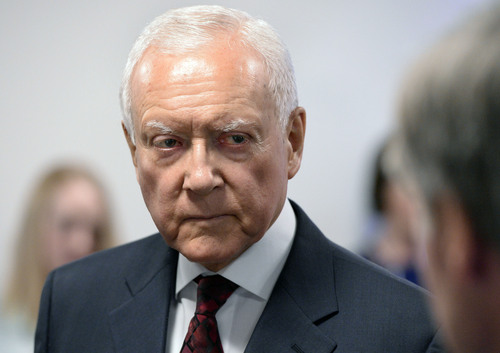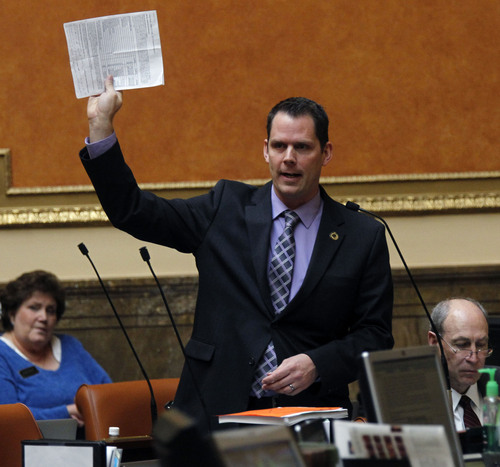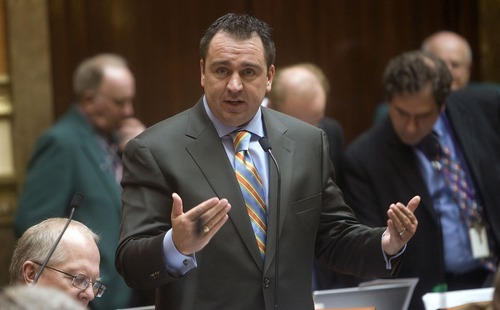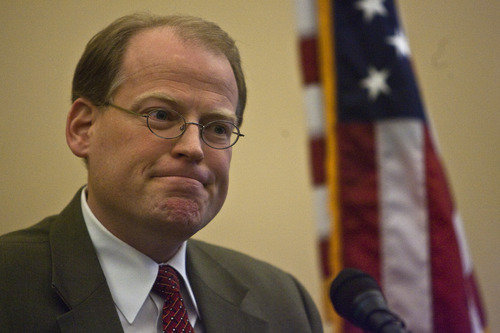This is an archived article that was published on sltrib.com in 2014, and information in the article may be outdated. It is provided only for personal research purposes and may not be reprinted.
While the U.S. Supreme Court now is allowing gay marriage in Utah, a legislator wants to ensure that churches, clergy, elected officials and others who oppose such weddings on religious grounds are not forced to perform them.
Rep. Jacob Anderegg, R-Lehi, said Tuesday he will push his proposal both in a constitutional amendment and a regular bill next year. Such legislation is among a flurry of potential bills being discussed in the aftermath of the high court's decision not to hear the same-sex marriage case and allow lower court rulings to stand.
"It's a sad state of affairs that we feel like we have to prop up the First Amendment" and its guarantee of freedom of religion, Anderegg said. He adds that the Supreme Court, in his view, quashed 10th Amendment states' rights to oversee marriage, "So at what point are they also going to quash First Amendment rights?"
He said his legislation "doesn't deny anybody" a same-sex marriage. "They just may have to find someone else who's OK with it" to officiate.
Sen. Jim Dabakis, D-Salt Lake City, who is gay and married, said he does not foresee opposition to such legislation.
"I am perfectly OK with that. I don't think anybody ought to be required to perform a marriage they don't want to perform," he said. "And why would anybody want to be married by somebody who is coerced into marrying them? I wouldn't."
"You may not, Jim. But there may be others who do," Anderegg said about Dabakis' views. "I feel at some point it will become an issue."
For example, he said, he could see in his LDS Church "two members who are gay, who are in good standing, meaning they hold temple recommends, coming to their bishop and saying we want to get married in the temple. ... They are going to be told no," and they could sue for equal protection under the law for such a marriage.
Anderegg said he wants to "be out in front" legally before any such actions occur.
—
Just the beginning • Sen. Orrin Hatch, R-Utah, while talking to reporters Tuesday, said he shares concerns about ramifications of the court case.
"You can't even begin to think of all the things the LGBT community can come up with to demand certain privileges and rights," Hatch said. "So I think it's just the beginning of some very trying times for people who feel otherwise. And I think it's the beginning of trying times for folks who are gay."
Hatch, a former member of the Senate Judiciary Committee, also said he doesn't think the Supreme Court is finished with the issue of same-sex marriage.
"I do think this issue is not settled just yet." He said other cases are proceeding in lower courts, "And I suspect there will be at least one circuit where they will be against gay marriage. If that happens, I think the [high] court will have to face the issue and will have to bring it up."
Anderegg said his legislation would be aimed only at wedding officiators and churches. But he said he has heard that other lawmakers are considering carrying legislation seeking to protect businesses that do not want to participate in gay marriages, such as photographers and cake makers.
Unlike protections for churches and clergy, Dabakis said he would have a problem with bills aimed at carving out exemptions for businesses.
"I would have a problem if they start saying LGBT people are in a special class, and they can be discriminated against," Dabakis said. "Not only would I have a problem with that, I think the courts would have a problem with that."
Anderegg's legislation is not new. He introduced it in this year's Legislature, but leaders put a moratorium on debating any bills that even remotely related to gay marriage while the court case was active.
—
Moratorium lifted • With the lawsuit now ended, House Majority Whip Greg Hughes, R-Draper, who is running for House speaker, said on the Trib Talk podcast Tuesday that the moratorium is over.
"I think some of the issues that had been waiting will be discussed now. We have a new world today," he said. "I think these issues will come up. I think that you will hear them in committees. There will be a robust debate."
Hughes said afterward that likely includes Anderegg's bills and one sponsored by Sen. Steve Urquhart, R-St. George, seeking to prohibit housing and employment discrimination against lesbian, gay, bisexual and transgender Utahns.
Also on Trib Talk, Rep. Kraig Powell, R-Heber City, backed away from something he had discussed Monday — perhaps coining a new term besides "marriage" to deal with parental-rights issues he says are distinct and must be resolved for same-sex couples. He called it "pairage."
"I herby withdraw any mention of 'pairage,' " he said. Later he said that was based on a lot of "negative feedback in the last 24 hours" after he mentioned it in the news media.
Powell has opened a bill file looking at how state statutes may need to be revised after the gay-marriage ruling. For example, the state code chapter on marriage is called "Husband and Wife," and he says that is just one example of something that will need to be reworded. Aside from dropping the term "pairage," Powell said he still believes lawmakers will need to resolve issues involving such things as the rights of birth parents and same-sex parents.
"When you are dealing with what are artificial and adoptive rights that same-sex couples have for children and families," Powell said, "they are different." —
Proposed constitutional amendment
"No religious organization, association, or society, and no individual acting in a role connected with a religious organization, association, or society, may be required or compelled to solemnize, officiate in, or recognize a marriage or religious rite of marriage in violation of their right of conscience or their free exercise of religion."









